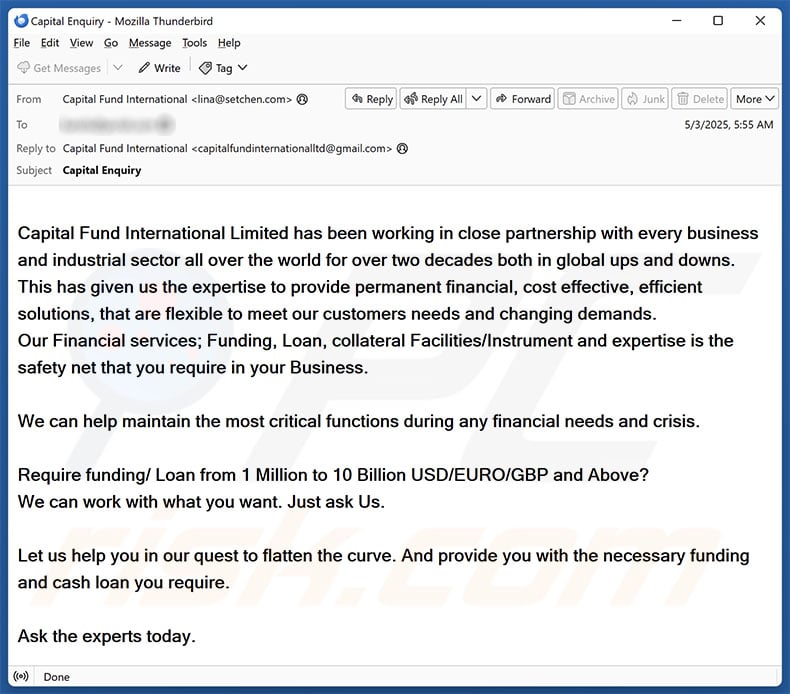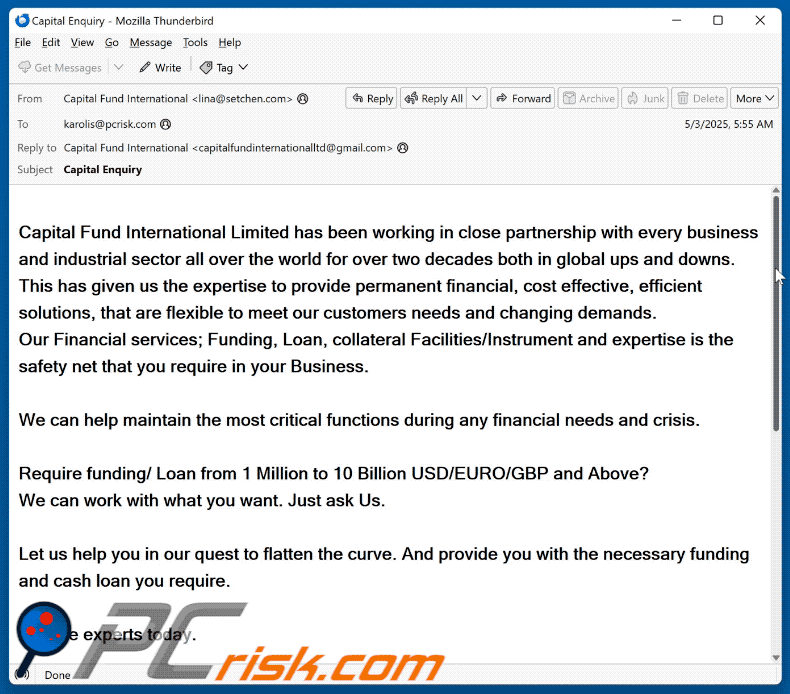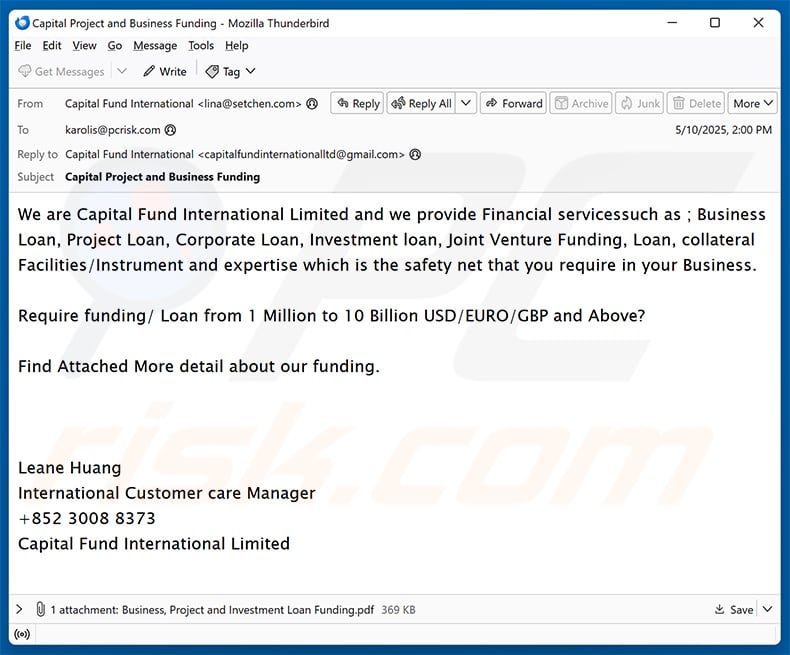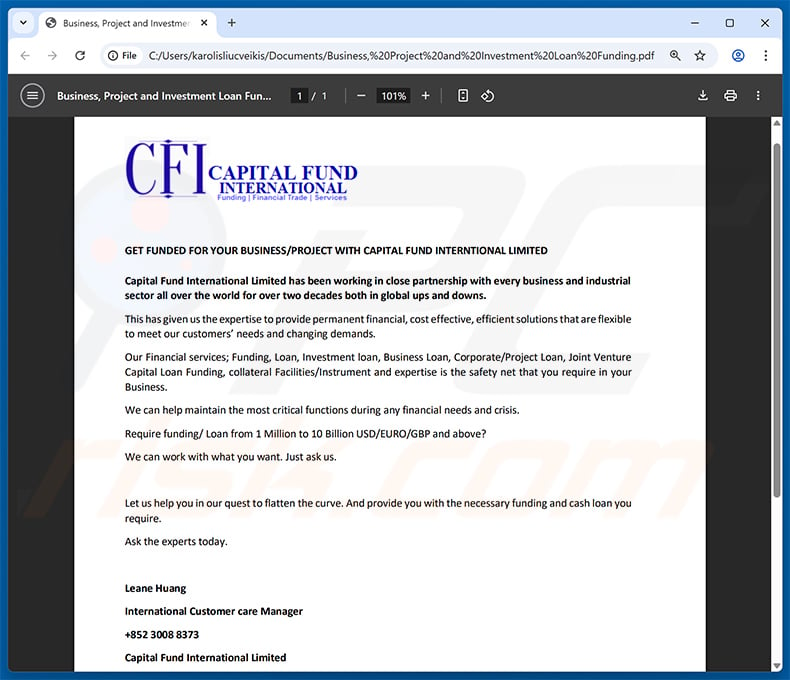How to recognize spam emails like "Capital Fund International"
Phishing/ScamAlso Known As: "Capital Fund International" spam email
Get free scan and check if your device is infected.
Remove it nowTo use full-featured product, you have to purchase a license for Combo Cleaner. Seven days free trial available. Combo Cleaner is owned and operated by RCS LT, the parent company of PCRisk.com.
What kind of email is "Capital Fund International"?
After reading this "Capital Fund International" email, we determined that it is spam. The message is a business offer of sorts, wherein the recipient's company can take out a large loan or receive funding from the sender. This is a scam that likely targets sensitive information or aims to trick victims into sending scammers money.

"Capital Fund International" email scam overview
The spam email with the subject "Capital Enquiry" (may vary) begins by describing the sender's ("Capital Fund International Limited") expertise in the area of finance. The recipient's company is offered funding or a loan ranging from one million to ten billion in US dollars, euros, or pounds.
It must be emphasized that the information in this email is false, and this mail is not associated with any legitimate entities. Exactly how the scam promoted by this spam campaign operates is currently unknown.
Oftentimes, finance-themed emails try to extract victims' private data or funds. Targeted information can include personally identifiable details and/or finance-related data (e.g., ID card details, passport photos/scans, online bank account or cryptowallet log-in credentials, credit/debit card numbers, etc.).
Users may be deceived into directly transferring money to scammers; this is typically achieved through difficult-to-trace methods that are unlikely to lead back to the cyber criminals and eliminate chances of fund recovery for victims. It is possible that this scam shares similarities with technical support or refund scams.
To summarize, victims of spam mail can experience system infections, serious privacy issues, financial losses, and identity theft. If you have disclosed personally identifiable or finance-related information – immediately contact the appropriate authorities.
| Name | "Capital Fund International" spam email |
| Threat Type | Phishing, Scam, Social Engineering, Fraud |
| Fake Claim | Recipient's company is offered funding or a loan. |
| Symptoms | Unauthorized online purchases, changed online account passwords, identity theft, illegal access of the computer. |
| Distribution methods | Deceptive emails, rogue online pop-up ads, search engine poisoning techniques, misspelled domains. |
| Damage | Loss of sensitive private information, monetary loss, identity theft. |
| Malware Removal (Windows) |
To eliminate possible malware infections, scan your computer with legitimate antivirus software. Our security researchers recommend using Combo Cleaner. Download Combo CleanerTo use full-featured product, you have to purchase a license for Combo Cleaner. 7 days free trial available. Combo Cleaner is owned and operated by RCS LT, the parent company of PCRisk.com. |
Spam campaigns in general
We have examined numerous spam campaigns, and these emails are used to promote various scams and spread all kinds of malware. Spam mail is often poorly written and riddled with grammatical/spelling mistakes; however, it can be competently put together and even believably disguised as messages from genuine entities (e.g., companies, organizations, institutions, service providers, authorities, etc.).
"WorldMillions Lotto", "Looking For Relationship", "Bittrex Remaining Claim", "Wells Fargo - Important Security Check", "MT103 Payment Advice", "SumUp - Update Your Profile", "Global Development & Financial Support", "Mailbox Capacity Reduced", and "DHL - Customs Clearance" are merely some of our latest articles on spam campaigns.
How do spam campaigns infect computers?
Spam campaigns proliferate malware by distributing virulent files as attachments or download links. These files come in various formats, e.g., executables (.exe, .run, etc.), archives (RAR, ZIP, etc.), documents (PDF, Microsoft Office, Microsoft OneNote, etc.), JavaScript, and so on.
Once such a file is opened – the infection chain is initiated. However, some formats need additional interaction. For example, Microsoft Office files require users to enable macro commands (i.e., editing/content), while OneNote documents need them to click on embedded links or files.
How to avoid installation of malware?
We highly recommend being cautious with incoming emails and other messages. We advise against opening attachments or links found in suspect/irrelevant mail, as they can be harmful or infectious.
However, malware is distributed using various methods. Therefore, it is essential to be vigilant when browsing since the Internet is rife with deceptive and dangerous content.
Another recommendation is to download only from official and verified sources. Software must be activated and updated using legitimate functions/tools, as illegal activation ("cracking") tools and third-party updates can contain malware.
It is paramount for device/user safety to have a dependable antivirus installed and kept up-to-date. Security programs must be used to run regular system scans and to remove detected threats and issues. If you've already opened malicious attachments, we recommend running a scan with Combo Cleaner Antivirus for Windows to automatically eliminate infiltrated malware.
Text presented in the "Capital Fund International" spam email letter:
Subject: Capital Enquiry
Capital Fund International Limited has been working in close partnership with every business and industrial sector all over the world for over two decades both in global ups and downs.
This has given us the expertise to provide permanent financial, cost effective, efficient solutions, that are flexible to meet our customers needs and changing demands.
Our Financial services; Funding, Loan, collateral Facilities/Instrument and expertise is the safety net that you require in your Business.We can help maintain the most critical functions during any financial needs and crisis.
Require funding/ Loan from 1 Million to 10 Billion USD/EURO/GBP and Above?
We can work with what you want. Just ask Us.Let us help you in our quest to flatten the curve. And provide you with the necessary funding and cash loan you require.
Ask the experts today.
Leane Huang
International Customer care Manager
+852 3008 8373
Capital Fund International LimitedRegistered Number: 0516110, with Approved Business Certificate License Number: 19305883-000.
Providing Lending Platform, Dynamic Financial Services and Solutions to meet Your Very specific financial needs.
We are the pacesetter. We set the pace, we break the record, and we surpass it for our clients.
Appearance of the "Capital Fund International" spam email (GIF):

Another example of an email from "Capital Fund International" spam campaign:

Text presented within:
Subject: Capital Project and Business Funding
We are Capital Fund International Limited and we provide Financial servicessuch as ; Business Loan, Project Loan, Corporate Loan, Investment loan, Joint Venture Funding, Loan, collateral Facilities/Instrument and expertise which is the safety net that you require in your Business.
Require funding/ Loan from 1 Million to 10 Billion USD/EURO/GBP and Above?
Find Attached More detail about our funding.
Leane Huang
International Customer care Manager
+852 3008 8373
Capital Fund International Limited
Screenshot of the attached PDF document:

Instant automatic malware removal:
Manual threat removal might be a lengthy and complicated process that requires advanced IT skills. Combo Cleaner is a professional automatic malware removal tool that is recommended to get rid of malware. Download it by clicking the button below:
DOWNLOAD Combo CleanerBy downloading any software listed on this website you agree to our Privacy Policy and Terms of Use. To use full-featured product, you have to purchase a license for Combo Cleaner. 7 days free trial available. Combo Cleaner is owned and operated by RCS LT, the parent company of PCRisk.com.
Quick menu:
- What is "Capital Fund International" spam email?
- Types of malicious emails.
- How to spot a malicious email?
- What to do if you fell for an email scam?
Types of malicious emails:
![]() Phishing Emails
Phishing Emails
Most commonly, cybercriminals use deceptive emails to trick Internet users into giving away their sensitive private information, for example, login information for various online services, email accounts, or online banking information.
Such attacks are called phishing. In a phishing attack, cybercriminals usually send an email message with some popular service logo (for example, Microsoft, DHL, Amazon, Netflix), create urgency (wrong shipping address, expired password, etc.), and place a link which they hope their potential victims will click on.
After clicking the link presented in such email message, victims are redirected to a fake website that looks identical or extremely similar to the original one. Victims are then asked to enter their password, credit card details, or some other information that gets stolen by cybercriminals.
![]() Emails with Malicious Attachments
Emails with Malicious Attachments
Another popular attack vector is email spam with malicious attachments that infect users' computers with malware. Malicious attachments usually carry trojans that are capable of stealing passwords, banking information, and other sensitive information.
In such attacks, cybercriminals' main goal is to trick their potential victims into opening an infected email attachment. To achieve this goal, email messages usually talk about recently received invoices, faxes, or voice messages.
If a potential victim falls for the lure and opens the attachment, their computers get infected, and cybercriminals can collect a lot of sensitive information.
While it's a more complicated method to steal personal information (spam filters and antivirus programs usually detect such attempts), if successful, cybercriminals can get a much wider array of data and can collect information for a long period of time.
![]() Sextortion Emails
Sextortion Emails
This is a type of phishing. In this case, users receive an email claiming that a cybercriminal could access the webcam of the potential victim and has a video recording of one's masturbation.
To get rid of the video, victims are asked to pay a ransom (usually using Bitcoin or another cryptocurrency). Nevertheless, all of these claims are false - users who receive such emails should ignore and delete them.
How to spot a malicious email?
While cyber criminals try to make their lure emails look trustworthy, here are some things that you should look for when trying to spot a phishing email:
- Check the sender's ("from") email address: Hover your mouse over the "from" address and check if it's legitimate. For example, if you received an email from Microsoft, be sure to check if the email address is @microsoft.com and not something suspicious like @m1crosoft.com, @microsfot.com, @account-security-noreply.com, etc.
- Check for generic greetings: If the greeting in the email is "Dear user", "Dear @youremail.com", "Dear valued customer", this should raise suspiciousness. Most commonly, companies call you by your name. Lack of this information could signal a phishing attempt.
- Check the links in the email: Hover your mouse over the link presented in the email, if the link that appears seems suspicious, don't click it. For example, if you received an email from Microsoft and the link in the email shows that it will go to firebasestorage.googleapis.com/v0... you shouldn't trust it. It's best not to click any links in the emails but to visit the company website that sent you the email in the first place.
- Don't blindly trust email attachments: Most commonly, legitimate companies will ask you to log in to their website and to view any documents there; if you received an email with an attachment, it's a good idea to scan it with an antivirus application. Infected email attachments are a common attack vector used by cybercriminals.
To minimise the risk of opening phishing and malicious emails we recommend using Combo Cleaner Antivirus for Windows.
Example of a spam email:

What to do if you fell for an email scam?
- If you clicked on a link in a phishing email and entered your password - be sure to change your password as soon as possible. Usually, cybercriminals collect stolen credentials and then sell them to other groups that use them for malicious purposes. If you change your password in a timely manner, there's a chance that criminals won't have enough time to do any damage.
- If you entered your credit card information - contact your bank as soon as possible and explain the situation. There's a good chance that you will need to cancel your compromised credit card and get a new one.
- If you see any signs of identity theft - you should immediately contact the Federal Trade Commission. This institution will collect information about your situation and create a personal recovery plan.
- If you opened a malicious attachment - your computer is probably infected, you should scan it with a reputable antivirus application. For this purpose, we recommend using Combo Cleaner Antivirus for Windows.
- Help other Internet users - report phishing emails to Anti-Phishing Working Group, FBI’s Internet Crime Complaint Center, National Fraud Information Center and U.S. Department of Justice.
Frequently Asked Questions (FAQ)
Why did I receive this email?
Spam emails are not personal, even if these message include information relevant to the recipients. Cyber criminals distribute spam emails by the thousand with the hopes that at least some recipients will fall for their scams.
I have provided my personal information when tricked by this spam email, what should I do?
If you have provided your log-in credentials – immediately change the passwords of all potentially compromised accounts and inform their official support. However, if you have disclosed other private data (e.g., ID card details, credit card numbers, etc.) – contact relevant authorities without delay.
I have read a spam email but didn't open the attachment, is my computer infected?
Opening/Reading an email does not pose an infection threat. Systems are infected when malicious attachments or links are opened/clicked.
I have downloaded and opened a file attached to a spam email, is my computer infected?
Whether the computer was infected might depend on the format of the opened file. Once opened, executables cause infections almost without fail. However, some formats – like documents – might need additional actions. Hence, the infection may only be triggered after macros are enabled, embedded content is clicked, or other actions are performed.
Will Combo Cleaner remove malware infections present in email attachments?
Combo Cleaner is designed to scan computers and eliminate all kinds of threats. It can detect and remove most of the known malware infections. Keep in mind that performing a full system scan is essential since high-end malicious programs tend to hide deep within systems.
Share:

Tomas Meskauskas
Expert security researcher, professional malware analyst
I am passionate about computer security and technology. I have an experience of over 10 years working in various companies related to computer technical issue solving and Internet security. I have been working as an author and editor for pcrisk.com since 2010. Follow me on Twitter and LinkedIn to stay informed about the latest online security threats.
PCrisk security portal is brought by a company RCS LT.
Joined forces of security researchers help educate computer users about the latest online security threats. More information about the company RCS LT.
Our malware removal guides are free. However, if you want to support us you can send us a donation.
DonatePCrisk security portal is brought by a company RCS LT.
Joined forces of security researchers help educate computer users about the latest online security threats. More information about the company RCS LT.
Our malware removal guides are free. However, if you want to support us you can send us a donation.
Donate
▼ Show Discussion